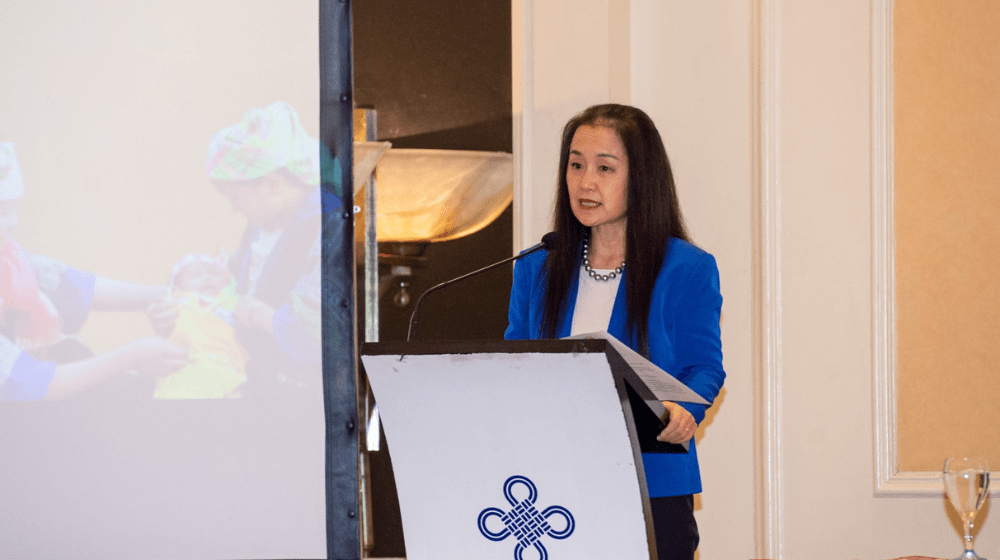- Mr Dinh Anh Tuan, Director of the Mother and Child Health Department, Ministry of Health;
- Representatives from the Ministry of Health, Provincial CDCs of Bac Kan, Lai Chau, Son La, Kon Tum, Dak Nong and Gia Lai;
- Representatives from MSD;
- Researchers from Hanoi University of Public Health
- My UNFPA colleagues,
- And representatives of Vietnamese reporters,
We are delighted to be gathered here today to discuss the result of a baseline survey for the Project: Leaving no one behind: Innovative interventions to reduce maternal mortality in the ethnic minority region in Vietnam”, which is funded by MSD, and implemented by UNFPA in collaboration with the Ministry of Health.
With a total financial contribution of USD 1.2 million from MSD for Mothers and MSD Viet Nam and USD 820,000 from UNFPA, this project is one of the most important initiatives for UNFPA Vietnam as it aims at reducing maternal mortality in 60 remote ethnic minority communes of six most disadvantaged provinces of Bac Can, Lai Chau, Son La, Dac Nong, Kon Tum and Gia Lai through innovative interventions to meet special needs of ethnic minority women who are at risk of being left behind in the country’s sustainable development process.
To achieve the Project’s objectives, a survey was conducted by researchers from the Hanoi University of Public Health in these 60 ethnic minority communes. Using different methods, the survey identified the needs to train local health providers and introduce behavior change communication and community mobilization strategies. Such programmatic interventions are to ensure Safe Motherhood of pregnant women, taking into account of local tradition and socio-cultural practices.
Dear participants,
Viet Nam has made significant progress in improving sexual and reproductive health of the general population in the past 20 years, and Vietnam was one of the only six countries in the world which achieved, in 2015, the maternal mortality reduction target of the Millennium Development Goal #5 (MDG5). However, disparities and inequalities remain in access to and utilization of sexual and reproductive health services among different ethnicities and regions.
Therefore, the findings of the survey play a significant role in narrowing these gaps. Among other findings, the survey shows that local commune health stations lack basic services, screening facility for maternal care, and essential equipment for antenatal care and child delivery. Only 11% of the ethnic minority mothers in these 60 communes receive antenatal care at least 4 times, which is the minimum requirement for ANC. The percentage of mothers delivered in health facilities is very low at about 30%. In terms of family planning, only 53% of mothers in these locations use contraceptives, and unmet need for family planning is estimated at 18%. For Thai women in particular, unmet need for family planning reached 49%. The overall percentage of ethnic minority women reporting bodily autonomy in using health services, having sexual intercourse, and using contraceptive methods reached 61% only.
The survey also indicates the need for professional training for health workers at district and communal levels, especially the skills to assess and detect pregnancy risks and manage emergency obstetric and neonatal care. Also, most ethnic minority mothers and their family members are not fully aware of the importance of safe motherhood, especially antenatal care and institutional delivery.
Dear participants,
I personally observed the vulnerability of ethnic minority communes when it comes to sexual and reproductive health during my field trip to Lai Chau province last year, which is one of the six participating provinces of this project. The ethnic minorities often reside in such remote and mountainous locations, far away from any health facilities, and even in these locations, skilled medical personnel and necessary medical equipment and supplies are very much limited.
I trust that the findings of the survey constitute good evidence for the development of innovative interventions in order to ensure the provision of quality sexual and reproductive health services to prevent maternal deaths, thus contributing to Vietnam’s efforts to achieve SDGs by 2030.
On this occasion, I would like to convey our sincere appreciation to MSD for Mothers and MSD Viet Nam for financing innovative interventions to prevent ethnic minority mothers from dying from pregnancy and childbirth. We are very much inspired and encouraged to be able to partner with MSD, and this collaboration itself is innovative, spearheading the way that the UN, especially UNFPA, is expanding its partnership base to ensure that no one is left behind towards the achievement of SDGs by 2030.
In collaboration with the Ministry of Health, Provincial Departments of Health, and partner civil society organizations, UNFPA will deliver the expected project outcome effectively to support vulnerable ethnic minority women.
Thank you for your attention.


